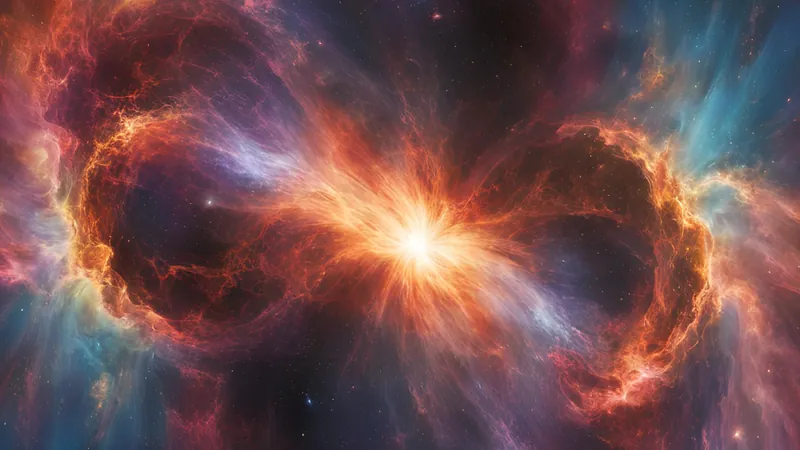
Is 2024 the Year We Finally Cracked the Mystery of Dark Energy? Here’s What Scientists Discovered!
2024-12-31
Author: Mei
Introduction
2024 is shaping up to be a groundbreaking year for the field of space science, especially regarding one of the universe's biggest enigmas: dark energy. For nearly three decades, dark energy has posed a significant challenge for cosmologists, representing 68% of the universe's total mass-energy content. This mysterious force is believed to be responsible for the accelerating expansion of the cosmos, and this year has provided scientists with tantalizing clues that could revolutionize our understanding of this cosmic phenomenon.
For context, dark energy became a prominent topic in the scientific community after multiple teams of astronomers discovered the accelerated expansion of the universe back in 1998 using data from supernova observations. Since then, the term "dark energy" has merely served as a placeholder, as researchers hope to eventually identify its true nature.
Imagine giving a child a push on a swing, watching them gradually come to a stop, and then—mystifyingly—they start swinging again, gaining momentum. The behavior of dark energy is akin to this scenario, stalling the universe’s initial slow down post-Big Bang and then revving it up at an astonishing speed.
The Breakthrough from DESI
The first-year data released from DESI has resulted in one of the most comprehensive cosmic maps ever created. DESI, equipped with 5,000 robotic "eyes," meticulously collects light from millions of galaxies covering over a third of our night sky. By analyzing the light collected, scientists can determine how galaxies are moving away from us—an effect known as "redshift."
Astoundingly, these findings suggest that dark energy might be changing over time, specifically hinting at a potential weakening of this force. This is significant because, under the current most widely accepted cosmological model—known as the Lambda Cold Dark Matter (LCDM)—dark energy is treated as a fixed "cosmological constant."
Luz Ángela García Peñaloza, a cosmologist involved with DESI, expressed her enthusiasm in April 2024: “The release of these results was a great day for cosmology, pointing to a 'decreasing' effect of dark energy over time. If confirmed, this discovery could be as groundbreaking as the original finding of the universe's accelerated expansion.”
A Revolutionary Shift?
As 2024 progresses, the notion that dark energy could be changing—evolving—creates ripples of excitement in the scientific community. García Peñaloza highlighted that for many years, most observational data aligned with the idea that dark energy is a constant. However, 2024 has presented multiple surveys indicating this could be incorrect, and they suggest dark energy varies over time.
This shift away from viewing dark energy as a constant opens the door to innovative models. One such theory, known as “early dark energy” (EDE), posits that dark energy has been around longer than theorized and has influenced cosmic evolution subtly for billions of years. Results from DESI seem to lend credence to this evolving concept.
Looking Ahead: The Next Wave of Discoveries
While the idea of a dynamic dark energy may soon gain momentum, the journey to prove this hypothesis is still in its infancy. More data is required to verify these indications. The DESI survey is set to collect information over its five-year mission, with the next batch of results (Years 2 and 3) anticipated in Spring 2025.
Moreover, the European Space Agency's new Euclid space telescope, launched in July 2023, is expected to provide additional invaluable data next year. As scientists anticipate this influx of information, they hope to unravel the secrets of dark energy further and its potential connection with several other cosmic phenomena.
As 2024 unfolds, the cosmos continues to intrigue us, and researchers are on the brink of potentially redefining our understanding of the universe's most mysterious ingredient! Stay tuned as we prepare for the wave of discoveries heading toward us in 2025—could they finally be the key to unraveling the mysteries of dark energy?


 Brasil (PT)
Brasil (PT)
 Canada (EN)
Canada (EN)
 Chile (ES)
Chile (ES)
 Česko (CS)
Česko (CS)
 대한민국 (KO)
대한민국 (KO)
 España (ES)
España (ES)
 France (FR)
France (FR)
 Hong Kong (EN)
Hong Kong (EN)
 Italia (IT)
Italia (IT)
 日本 (JA)
日本 (JA)
 Magyarország (HU)
Magyarország (HU)
 Norge (NO)
Norge (NO)
 Polska (PL)
Polska (PL)
 Schweiz (DE)
Schweiz (DE)
 Singapore (EN)
Singapore (EN)
 Sverige (SV)
Sverige (SV)
 Suomi (FI)
Suomi (FI)
 Türkiye (TR)
Türkiye (TR)
 الإمارات العربية المتحدة (AR)
الإمارات العربية المتحدة (AR)